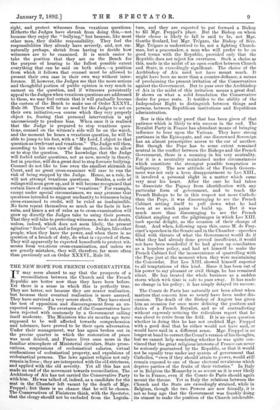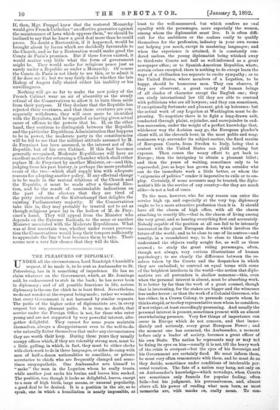THE NEW HOPE FOR FRENCH CONSERVATIVES.
IT may seem absurd to say that the prospects of a reconciliation between the Church and the French Republic are better now than they have been before. Yet there is a sense in which this is perfectly true. They are better, not because they are nearer realisation, but because their eventual realisation is more assured. They have survived a very severe shock. They have stood the test of opposition and discouragement from an un- expected source. The overtures of the Conservatives have been rejected with contumely by a Government calling itself moderate. The Ministers who six months ago were supposed. to be well affected towards comprehension and tolerance, have proved to be their open adversaries. Under their management, war has again broken out in the precise quarter in which the restoration of peace was most desired, and France lives once more in the familiar atmosphere of Ministerial circulars, State prose- cutions, suspensions of ecclesiastical salaries, virtual confiscations of ecclesiastical property, and expulsions of ecclesiastical persons. The laws against religion not only remain in force ; they are interpreted with the old strictness, and applied with the old severity. Yet all this has not made an end of the movement towards reconciliation. The Archbishop of Aix has not carried the Conservative Party with him. He was talked of, indeed, as a candidate for the seat in the Chamber left vacant by the death of Mgr. Freppel ; but there is no chance that he will be chosen. The Conservatives of Finisterre think, with the Spectator, that the clergy should not be excluded from the Legisla- ture, and they are expected to put forward a Bishop to fill Mgr. Freppel's place. But the Bishop on whom their choice is likely to fall is said to be, not Mgr. Gouthe Soulard, but Mgr. Tr6garo, the Bishop of Seez. Mgr. Tr6garo is understood to be, not a fighting Church- man, but a peacemaker, a man who will prefer to be on good terms with the Republic, provided only that the Republic does not reject his overtures. Such a choice as this, made in the midst of an open conflict between Church and State, is exceedingly significant. The choice of the Archbishop of Aix need not have meant much. It might have been no more than a counter-defiance, a means of proclaiming the present irritation of the Conservatives against the Government. But to pass over the Archbishop of Aix in the midst of this irritation means a great deal. It shows on what a solid foundation the Conservative desire for peace rests. It testifies to the ability of the Independent Right to distinguish between things and persons, between Republican institutions and Republican administration.
Nor is this the only proof that has been given of that patience which is likely to win success in the end. The Royalist Party in France has abundant means of bringing influence to bear upon the Vatican. They have strong partisans in the Episcopate, and one discrowned Sovereign has an almost prescriptive access to the ear of another. But though the Pope has to some extent remained neutral in the conflict between the Bishops and the French Government, there is a meaning in his very neutrality. For it is a neutrality maintained under circumstances which constitute the strongest possible temptation to belligerency. The new attitude of the French Govern- ment was not only a keen disappointment to Leo XIII., it involved a personal slight in a matter which came very near his heart. After the care he had taken to dissociate the Papacy from identification with any particular form of government, and to teach the French Bishops to be in this respect not more Catholic than the Pope, it was discouraging to see the French Cabinet setting itself to pull down what he had been at so much pains to build up. But it was much more than discouraging to see the French Cabinet singling out the pilgrimages in which Leo XIII. took special delight, as the occasion of their change of front. And when, following upon this, came M. de Frey- cinet's speeches in the Senate and in the Chamber—speeches filled with threats of what the Government would do if what they had already done proved insufficient, it would not have been wonderful if be had given up conciliation as a hopeless policy, and had set himself to make the French Cabinet feel the inconvenience of quarrelling with the Pope just at the moment when they were maintaining the Concordat. But Leo XIII. showed himself superior to all temptations of this kind. Since it has been out of his power to say pleasant or civil things, he has remained silent. He has treated the whole business as a sudden storm which with time is safe to pass away. It has made no change in his policy; it has simply delayed its success.
The Comte de Paris has naturally not been silent when matters that concern him so nearly have been under dis- cussion. The death of the Bishop of Angers has given him an occasion for once more defining the position and duties of a French Royalist, and so of contradicting without expressly noticing the ridiculous report that he was about to retire from the field. It is an open question whether in doing this he has not credited Mgr. Freppel with a good deal that he either would not have said, or would have said in a different sense. Mgr. Freppel is no longer at hand to correct the Count's version of his thoughts, but we cannot help wondering whether he was quite con- vinced that the great religious interests of France can never be seriously guaranteed by the Republic, or that it would not be equally true under any system of government that Catholics, "even if they should attain to power, would still remain exposed to one of those electoral revulsions which deprive parties of the fruits of their victories." In Italy or in Belgium the Monarchy is as secure as it is ever likely to be in France, even if the Comte de Paris should again mount the throne. Yet in Italy the relations between the Church and the State are exceedingly strained, while in Belgium, though the two Powers are now friendly, it is not so long ago that the Government was frankly doing its utmost to make the position of the Church intolerable. If, then, Mgr. Freppel knew that the restored Monarchy would give French Catholics " an effective guarantee against the maintenance of laws which oppress them," we should be inclined to say that he knew a good deal more than he could prove. No doubt a Restoration, if it happened, would be brought about by forces which are decidedly favourable to the Church, and so far a Restoration would make good the Comte de Paris's promises. But if these forces existed, it would matter very little what the form of government might be. They would make for religious peace just as surely under a Republic as under a. Monarchy. Of course the Comte de Paris is not likely to see this, or to admit it if he does see it; but we may fairly doubt whether the late Bishop of Angers fully shared either his inability or his unwillingness.
Nothing will go so far to make the new policy of the French Cabinet wear an air of absurdity as the steady refusal of the Conservatives to allow it to turn them aside from their purpose. If they declare that the Republic has rejected their overtures, and that these overtures are con- sequently withdrawn, they will once more be identified with the Royalists, and be regarded as having given actual cause of offence to the powers that be. If, on the other hand, they continue to distinguish between the Republic and the particular Republican Administration that happens to be in power, the moderate party in the constituencies will be led to see that the militant attitude assumed by M. de Freycinet has been assumed, in the interest not of the Republic, but of his own Cabinet. If this fact becomes generally recognised, Moderate Republicans will have an excellent motive for returning a Chamber which shall either replace M. de Freycinet by another Minister, or—and this, judging from his past history, is perhaps the more probable event of the two—which shall supply him with adequate reasons for adopting another policy. If any effectual change is to be made in the mutual relations of the Church and the Republic, it must be made after a General Elec- tion, and be the result of unmistakable indications on the part of the electors that they are tired of the petty imitation of the Kulturkampf that delights the existing Parliamentary majority. If the Conservatives take this in, they may probably be trusted not to act as though religious peace lay in the hollow of M. de Frey- cinet's hand. They will appeal from the Minister who depends on the Extreme Radicals, to the same or another Minister associated with the Moderate Republicans. What was at first uncertain was, whether under recent provoca- tion the Conservatives would keep their tempers sufficiently to appreciate the line it best becomes them to take. There seems now a very fair chance that they will do this.















































 Previous page
Previous page